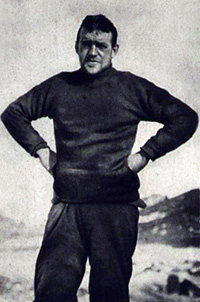Sir Ernest Shackleton
 |
Sir Ernest Henry Shackleton (February 15, 1874 – January 5, 1922) was a British explorer and a principal figure in the Heroic Age of Antarctic Exploration. He was born in County Kildare, Ireland to an Anglo-Irish family. A voracious reader but a bored student, he left school at 16 to go to sea as an apprentice on a sailing vessel. He traveled the world, learned the mariner’s trade, and worked his way through the ranks of the merchant marine. In 1900 he landed an appointment as third of the National Antarctic Expedition. He accompanied Capt. Robert Falcon Scott and a small group on a southward march towards to pole, which set a record but subjected all to snow blindness, frostbite, and scurvy on the return journey, leaving Shackleton sufficiently debilitated to be sent home. As the first to return to Britain he was in demand and eventually became secretary of the Royal Scottish Geological Society. He married and dabbled in business and politics before garnering support for another expedition, the Nimrod expedition of 1907-1909 that came within 97 miles of the pole and made him a public hero. He maintained a strenuous schedule of lectures and public appearances and tried to capitalize on his celebrity without much luck. His expedition to make the transcontinental crossing followed in 1914-1917, after which he returned to the lecture circuit and published South in 1919. He set off on his last journey south in 1921 and died of a fatal heart on South Georgia Island in January 1922. |
South: The Story of Shackleton’s Last Expedition 1914-1917
The race to reach the South Pole was won by Norwegian Roald Amundsen in 1911 after two British exped..
$11.99

